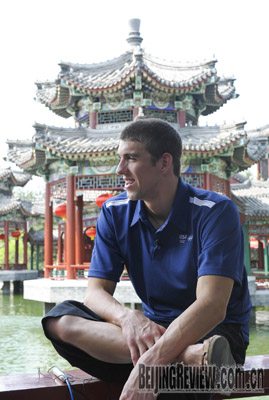|
|

|
|
HISTORY MAKER: American swimmer Michael Phelps relaxes on the grounds of a former prince's house in Beijing after winning his eighth gold medal |
After winning his sixth gold medal at the Beijing Olympics with a world record swim in the 200 meters individual medley in 1 minute, 54.23 seconds, Michael Phelps read a text message from his friend to the press conference, "It is ridiculous how many times a day I have to see your ugly face on TV."
Nobody would really blame this 23-year-old star swimmer for stealing the show in Olympic coverage. When Phelps won a history-making eighth gold medal in Beijing on August 17, spectators in the National Aquatics Center, also known as the Water Cube, cheered him on. That win gave him more Olympic gold medals at one Olympics than anyone in history, taking him past fellow swimmer Mark Spitz's seven-gold victory at the 1972 Munich Olympics.
Phelps was without doubt the busiest swimmer at the Olympics. In the nine days since August 9, he swam in 20 races, the closest less than half an hour apart.
This busy schedule did not stop Phelps from breaking seven world records in Beijing. The golden boy's longtime coach Bob Bowman said that nothing could stop Phelps from creating miracles at the Water Cube. However, Phelps' epic journey was not without setbacks. Half way through the 200 meters butterfly, his swimming goggles were filled with water due to a problem with them, which left him unable to see clearly for the last 100 meters. Phelps said to calculate how far he was from the end of the pool, in order to turn at the right moment, he had to count strokes and pray he didn't miscalculate.
Body shape
Phelps is naturally built to be a good swimmer. Besides his inverted pyramid body structure, his legs are disproportionately short to his body. His long arms help to propel him through the water and also give him the advantage of touching the end of the pool earlier.
Scientists from the University of Washington said that Phelps' enormous feet are like huge paddles that drive him forward, which could minimize the water resistance he receives.
"He has enormous lung capacity of 15,000 milliliters, which enables him to stay underwater longer. The content of lactic acid in his body is only half the level of a normal person," said Luo Xuejuan, a retired Chinese Olympic gold medal-winning swimmer.
Lactic acid is the reason muscles become fatigued. That means that when other people take an hour to recover from a race, Phelps needs only 20 to 30 minutes. This is why he can compete in up to eight events in one Olympics.
Phelps eats and drinks about 4,000 calories every day. One staff member at the Olympic Village said that he once saw Phelps eating eight eggs in a row at breakfast.
| 